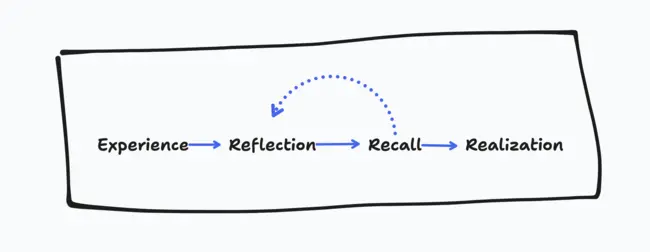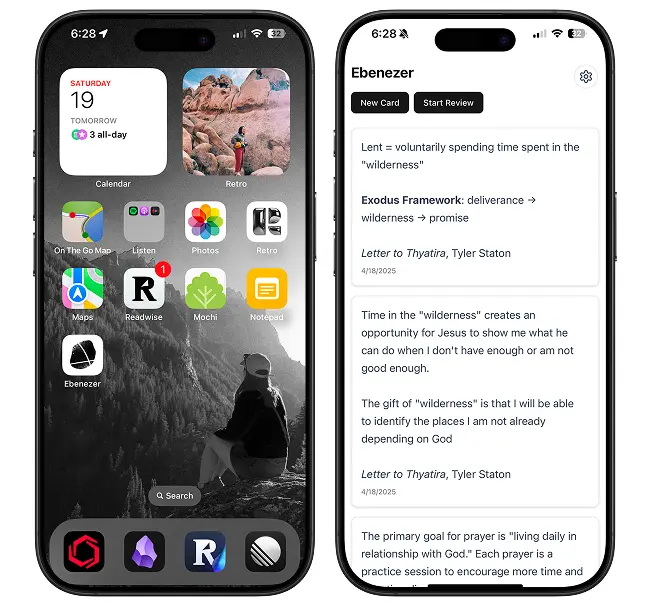Remembrance, Sort-Of Defined - Ebenezer 2025 W16
Journal
I’ve been learning a lot about Remembrance and related topics while building Ebenezer. Learning while building makes development quite difficult, since my mental model for what “good” Remembrance is keeps changing. However, this week was a good reminder that my personal goal with this project is to develop Remembrance as a core practice in my Rule of Life; Ebenezer is simply a canvas to curate a tool that flexes to my needs, as I grow in the practice.
This week, my brain has been saturated with the modern Memory Systems canon. Heavy influencers for me were – Michael Nielsen1, Andy Matuschak, and Piotr Wozniak.
The main motif I’m holding onto is – Memory systems make memory a choice.
Or through my lens – remembering what God has spoken cannot be left to chance, Remembrance is an active spiritual practice that makes it a choice. Ebenezer is the result of my soul’s call for my body to practice fixing my memory on the teaching, testimonies, and revelations God has given me.
I discussed remembrance with my dad (a pastor), and he shared many examples of remembrance throughout scripture. God really knew something about how our brains work2 when he commanded the Israelites to use various memory techniques throughout their history. I view modern cognitive science as an example of how scientific discoveries reveal more of God’s incredible design. I’m looking forward to diving further into stories of remembrance throughout scripture over the coming weeks to find intersections between long-standing memory traditions and modern learning science.
Remembrance Progression
One of the key questions I had at the end of last week was “what is the spiritual practice of remembrance?”
Here’s my working definition and a corresponding framework for the Remembrance Progression.
Working Definition
Remembrance is the practice of reviewing and internalizing my past experiences, learnings, and spiritual epiphanies so that they inform how I live today.
Progressive Framework

The practice of Remembrance covers a few phases that form a semi-linear progression.
- Experience: Remembrance is rooted in things I experience. God speaks to me through things I see, hear, and live through – a beautiful rainbow, sermons from my local pastor, books by theologians, etc. Memories are snapshots of these experiences and personal spiritual insights are rooted in that which I experience.
- Reflection: This is the phase where I analyze what I experience to extrapolate meaning. What is God speaking to me through this picture? What was that spiritual swell I felt during that one part of the sermon? I take raw capture of my experiences - photos, journals, sermon notes, short-term memories - and codify them into atomic insights that are worth remembering.
- Recall: Once I’ve reflected and have a set of things I’d like to remember - I must practice recalling them regularly such that they become ingrained in my memory.
- Realization: The whole point of Remembrance is not to become a dictionary of facts or personal revelation. I am formed for the sake of others – the wisdom and testimony given to me is to be realized through my daily actions.
These phases inform each other: the end goal of Realization informs what I discern to be meaningful during Reflection; my method of Recall informs the format I codify insights during Reflection or capture Experiences; etc. etc.
This is a semi-linear progression because during Recall, new revelations may arise and generate new experiences to reflect upon.
Ebenezer Updates
This week, I expanded the scope of the app to include a database and backend, so I can access my Ebenezer data across devices.
I find that I like to do the distillation process of reflection on my computer - larger canvas for identifying key insights, faster card creation through keyboard input and shortcuts, the ability to view experience notes and sources while writing reflection cards. And I prefer recall on my mobile device - easier to build habits on, review on-the-go, prefer touch interactions for consumption.
I transitioned Ebenezer into a PWA, so I could get it onto my mobile device instantaneously. I don’t have serious native needs yet, so PWA may be the way to go to keep development nimble (I’m most familiar with web development).

On the Horizon
2 research topics + 2 reminders
Research Topic: Active Recall
I’m expecting to read a lot more on various memory system approaches and practice memory everyday this coming week, even on topics outside of what God is speaking to me.
The most striking difference from my original inspiration (Readwise) and “traditional” memory systems is the difference in recall method. Readwise implements a passive recall method of simply resurfacing quotes regularly. The memory systems I’ve researched this week involve active recall in the form of Q&A flashcards or Cloze-deletion flashcards.
I wasn’t sure which recall method was better for Ebenezer, but one thing I really like about trying active recall this week is that it forces meaningful and atomized Reflection when crafting questions. I’m looking forward to exploring this more
Research Topic: Linked Memories
Two big ideas I’ve had for Ebenezer are linking memories communally and temporally. Linking increases the retention power of a spaced repetition memory system, so I want to look further into how I can use links between memories.
Reminder: Avoid CTO stuff
I got into a rabbit hole on Mon/Tues this week trying to figure out which database was going to be “the best” for Ebenezer. This is a reminder to avoid these types of decisions. My strength is not technical architecture; the goal is to keep Ebenezer working and nimble enough for me to keep updating it.
When I think about CTO decision making, usually I fall into a scaling trap, which boxes the flexibility of early development.
Reminder: Find Others
One thing that I was inspired by in Nielsen’s article on How to make memory systems widespread was the conversations he would have with other memory nerds. I need to find people like that - memory nerds, Bible nerds, Remembrance nerds. I can’t be the only one thinking of this. Pull from the existing culture to build upon what others are also thinking about.
Footnotes
-
I read a lot of Nielsen this week. 2 core reading for me: (1) Augmenting Long-Term Memory: wrapping my mind on what a “memory system” looks and feels like + How to make memory systems widespread (2023): a reminder that developing the skill of memory is separate from the tool used for memory. This is helping me repress the notion of scaling Ebenezer to be a system for a general population. ↩
-
Forgetting Curve (Hermann Ebbinghaus): after learning something, we forget 50% of all new information within a day and 90% within a week. ↩